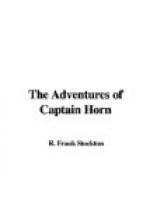When this task was finished, the captain took up his two empty canvas bags and went back to the caves, returning late in the afternoon, loaded rather more heavily than before. From the experiences of the morning, he believed that, with some folded pieces of cloth on each shoulder, he could carry without discomfort a greater weight than his first ones. The gold he now brought was made up into six bundles, and then the captain rested from his labors. He felt that he could do a much better day’s work than this, but this day had been very much broken up, and he was still somewhat awkward.
Day after day Captain Horn labored at his new occupation, and a toilsome occupation it was, which no one who did not possess great powers of endurance, and great hopes from the results of his work, could have undergone. In about a month the schooner was to be expected with another load of guano, and the captain felt that he must, if possible, finish his task before she came back. In a few days he found that, by practice and improvements in his system of work, he was able to make four trips a day between the cove of the Rackbirds and the caves. He rose very early in the morning, and made two trips before dinner. Sometimes he thought he might do more, but he restrained himself. It would not do for him to get back too tired to sleep.
During this time in which his body was so actively employed, his mind was almost as active, and went out on all sorts of excursions, some of them beneficial and some of them otherwise. Sometimes the thought came to him, as he plodded along bearing his heavy bags, that he was no more than a common thief, carrying away treasures which did not belong to him. Then, of course, he began to reason away these uncomfortable reflections. If this treasure did not belong to him, to whom did it belong? Certainly not to the descendants of those Spaniards from whom the original owners had striven so hard to conceal it. If the spirits of the Incas could speak, they would certainly declare in his favor over that of the children of the men who, in blood and torture, had obliterated them and their institutions. Sometimes such arguments entirely satisfied the captain; but if they did not entirely satisfy him, he put the whole matter aside, to be decided upon after he should safely reach the United States with such treasure as he might be able to take with him.
“Then,” he thought, “we can do what we think is right. I shall listen to all that may be said by our party, and shall act justly. But what I do not take away with me has no chance whatever of ever falling into the proper hands.”
But no matter how he might terminate such reflections, the captain always blamed himself for allowing his mind to occupy itself with them. He had fully decided that this treasure belonged to him, and there was no real reason for his thinking of such things, except that he had no one to talk to, and in such cases a man’s thoughts are apt to run wild.




